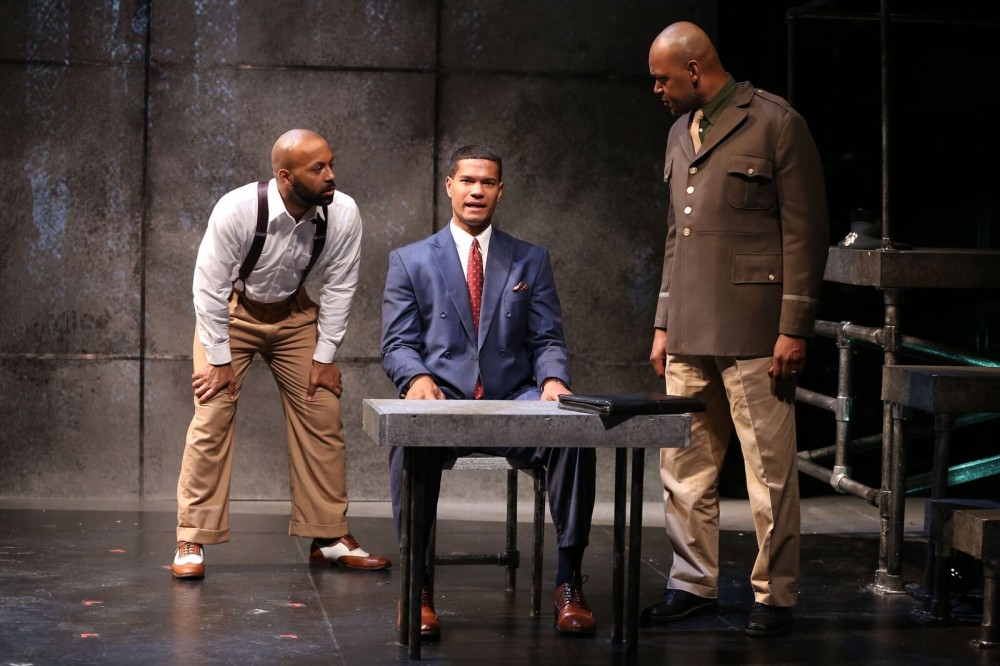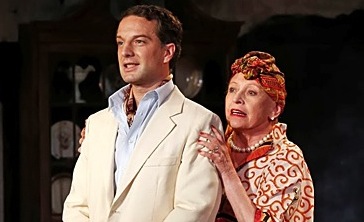by Samuel L. Leiter
James Wallert’s The Winning Side is a biographical drama about Wernher von Braun (1912-1977), the German rocket scientist. Von Braun (played by Sullivan Jones), one of the greatest scientists of his time, was the man behind the creation of the V2-ballistic missile and the Apollo 11 mission, which landed the first men on the moon. The play, presented by the Epic Theatre Ensemble, is a deeply interesting if occasionally stumbling dramatization of von Braun’s complicated life and enormous achievements.
Energetically directed by Ron Russell, The Winning Side is focused heavily on the ethical dilemmas represented by von Braun’s career. He not only worked under Nazi auspices but became an SS officer. On the other hand, he also had his own run-ins with the distrustful Nazi hierarchy.
In 1945, he surrendered and was brought to the USA. There, where many considered him a war criminal, the government overlooked his activities under Hitler so as to make use of his genius for its own purposes. It was one more example of the kind of expediency that he claimed for his own involvement in developing weapons of mass destruction.
Von Braun had dealings with people like Walt Disney and major political figures, including Lyndon Johnson and John F. Kennedy. (Each of these men is among the 16 characters played by Devin J. Haqq, using a trunkful of accents of varying authenticity.) His life also inspired TV shows and movies, notably 1960’s I Aim at the Stars, from which a clip is shown.
Von Braun’s Nazi period involved various moral questions, all pointing to the heavy toll we must pay for scientific progress. These questions are encapsulated in a riveting hearing conducted by a Major Taggert (Godfrey L. Simmons, Jr.) that casts shadows over this accomplished German physicist. Interestingly, his rationalizations of himself as an apolitical scientist unintentionally suggest parallels with the recent Kavanaugh hearings.
He was handsome, a gifted pianist, and had an eye for the opposite sex, qualities Wallert uses in crafting a romantic affair during the German occupation of France between von Braun and Margot Moreau (Melissa Friedman), a cabaret performer and dramatic actress. Moreau, who evokes a whiff of film noir melodrama, is semi-fictional, being based on an actual woman with whom von Braun had an affair. The play depicts her being unjustly punished as a collaborator.
When we first meet Margot, she’s performing as a sexy chanteuse. Later, garbed in classical robes, she enacts a scene from Sophocles’ Antigone, about a woman fighting for human rights in the face of dictatorial power. It’s clearly a moment of dramatic liberty inspired by Jean Anouilh’s modern-dress version of Antigone, which starred Monelle Valentin, was widely considered subtly subversive of the Vichy regime, and, like the play-within-the-play, was performed in February 1944.
The fictionalized version of von Braun’s love affair helps humanize the man but the play also must cover a lot of historical ground regarding his postwar career. Wallert uses the clunky device of jumping back and forth between 1943 and 1969, using a projected time line to let us know the year, aided by period-identifying music, like The Doors’ “Light My Fire” for 1967.
Chika Shimizu, who designed the projections and set (well-lit by Cat Tate Starmer), creates a spare, neutral space dominated at either side by movable, metal platforming, and a rear wall resembling large, concrete blocks. Cleverly, one block is replaced by a large fan, suggesting things ranging from a fiery rocket engine to the moon itself.
Simmons gives a strong, intelligent portrayal of the wry but commanding Major Taggert, the cautious minder of a man deemed a security threat. Friedman’s Margot is feisty, sexy, and dynamic, albeit with a slippery accent. Haqq covers so many roles he’s forced to depend on stereotypical voices and behavior. Too bad he’s forced to satirize Lyndon Johnson’s toilet conversations to the accompaniment of scatological sound effects. In the leading role, Jones is competent but fails to suggest either a Nazi officer or a rocket scientist.
Wallert wants the cast to reflect the racial and ethnic makeup of wherever the play is given. Thus all three male actors are black. Nothing in the play, though, has a racial slant, which makes you wonder what in the world this has to do with Wernher von Braun. It’s well-meant but distracting.
The Winning Side is on the winning side in questioning a scientist’s moral responsibility for the results of his activity. As comedian Mort Sahl allegedly said of von Braun, “He aimed at the stars—but he sometimes hit London.”
The Winning Side.Through October 28 at the Acorn Theatre/Theatre Row 410 West 42nd Street, between Ninth and Tenth Avenues). Two hours, one intermission. www.bfany.org/theatre-row/
Photos: Carol Rosegg

























